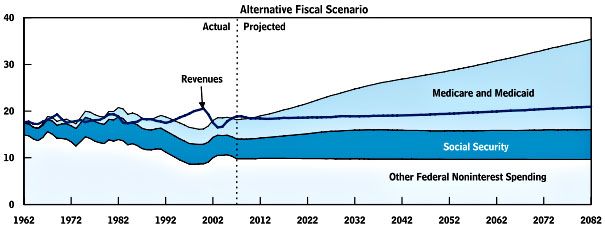Monday Business Edition
One of the emergent stories this weekend has been the question of whether Ireland is going to accept a bailout from the EU or the IMF. The proximate problem is that interest rates on Irish debt (bonds) and the price of insuring it against defaults (Credit Default Swaps) rose quite sharply on Thursday and Friday.
No holding back the tide
By David Clerkin, Markets Correspondent, The Sunday Business Post
14 November 2010
The rate attached to Irish ten-year bonds, which days earlier had touched the already eye-watering level of 7.8 per cent, quickly eclipsed 8 per cent on Monday and smashed through 9 per cent on Thursday.
…
To put this spiral into context, it is worth noting that the rate stood at 6.8 per cent less than two weeks ago. It was 6.5 per cent a month ago. It was 4.7 per cent a year ago.
…
Some bond traders zeroed in on the market for credit default swaps (CDSs) – the insurance policies on offer to protect investors from a borrower becoming unable to repay their money. The CDS market, though thinner than the market in government bonds, exhibited equally grim characteristics last week. The CDS premiums on AIB debt – insurance against AIB defaulting – exceeded 10 per cent, and those on debt issued by other Irish banks continued their unwelcome rise.
As the market fate of the Irish government has been intertwined with those of the banks it guaranteed since September 2008, some traders spoke of a vicious circle. As Irish banks fell increasingly out of favour, fears over the Irish government’s creditworthiness intensified.
Andrea Merkel made some remarks at the G20 Summit (which was so unproductive for Obama, but that’s another story) about using the European Financial Stability Fund for another bailout that the Irish government is objecting to strenuously.
The Irish people? Maybe not so much.
German solution seems irresistible to Irish people but not to the State
JOHN McMANUS, The Irish Times
Monday, November 15, 2010
Why is the Government against accessing the European Financial Stability Fund?
(Ireland, we) are led to believe, is a source of endless fascination, no little bafflement and some affection for the Germans. Right now they must be wondering why their chancellor, Angela Merkel, is being blamed for our latest crisis by the Taoiseach when she appears far more in tune with the Irish national mood than he does.
At a very fundamental level, all the German chancellor wants to do is change the rules of global finance so that the investors who lend money to feckless governments and banks must share the cost when things go wrong and thus be incentivised to act more responsibly. It’s a sentiment that pretty much everyone in Ireland would support.
Her proposals have an added populist attraction in Ireland as, inter alia, they would involve the burning of bank bondholders, the cause célèbre of much of the economic commentariat. This is because it is hard to see how Ireland could restructure its own debt – the nub of Merkel’s plan – without also restructuring the debts of the almost completely nationalised banking system.
…
From this point of view, the European Financial Stability Fund is starting to look irresistible. Not only do you get to burn the bond holders, you may even be able to help people out of negative equity! “What’s not for these Irish to like?” Merkel can legitimately ask. “Nothing” is the answer most of us would give.
So why is it then that we have a situation where the German chancellor and most Irish people seem to want one thing and our Government and the financial establishment want the other?
The answer is that, unfortunately, we must live with the immediate consequences of what is a laudable effort to reverse the balance of power between the financial system and sovereign governments. It is admirable – and indeed necessary – because the overriding lesson of the global financial crisis has been that governments have found themselves servants of the financial markets rather than the other way around. But while we would all like to get to the sun-lit uplands envisioned by Merkel, Ireland unfortunately might not survive the journey.
What does Merkel get out of it? The Euro is teetering on the brink and a lot of people are heavily invested in it, financially and politically.
Ireland and Greece should ditch the euro
By Peter Oborne, The Daily Telegraph
November 15th, 2010
This is what the Spanish prime minister, Jose Zapetero, declared in an interview with the Wall Street Journal as recently as September 22: “I believe that the debt crisis affecting Spain, and the eurozone in general, has passed.”
Or let’s listen to Patrick Honohan , governor of the Central Bank of Ireland, who soberly informed the markets last week that surging yields on Irish government debt would soon be back to normal levels. Both men are deluding themselves – and us. From time to time, events take a turn which is too grave, unsettling and unfathomable for politicians to cope with. They enter a state of denial. We are now living through one of those times.
The European Single Currency cannot be saved. Yet the euro elite are unable to bring themselves to acknowledge the magnitude of this disaster. They have convinced themselves that all is well. The pattern is familiar and indeed we in Britain experienced something very similar in the months leading up to Black Wednesday and the eviction of sterling from the Exchange Rate Mechanism in September 1992.
…
The euro elite is utterly ruthless. In its mission to save the euro, it is ready to throw tens of millions out of work and in the process destroy businesses, lives and whole economies. Consider the terrifying facts. The Irish economy has gone through recession and entered what economists call a depression. Its output contracted by an extraordinary 10 per cent last year, and may well do so again over the next 12 months.
In Spain, unemployment stands at 20 per cent, and youth unemployment a horrifying and tragic 40 per cent. The depths of misery lying behind these statistics cannot be exaggerated. A friend of mine who lives in the Spanish province of Andalusia tells me that some children in his village cannot go to school. This is because their parents cannot afford to buy them shoes. Effectively large parts of Europe are de-industrialising. In Greece, the economy may contract by 15 per cent over the next two years as a result of massive cuts in state spending.
For Greece and Ireland, there is an absurdly easy way back to economic growth: return to the drachma and the punt. Such a move would enable national currencies to fall back to levels where they can be internationally competitive – which in the case of hapless Greece would be approximately one third of where it stands today.
Assertions by the big bankers and eurocrats that such a move is technically impossible are self-serving and false. It would of course be very messy in the short term, but there are many examples of countries pulling out of currency unions with no lasting ill-effect.
The peripheral eurozone nations are being prevented from taking this sensible move by a cynical alliance between the big banks and the Brussels elite. The banks cannot countenance any contraction of the eurozone because once Greece, Ireland, Portugal and Spain pull out, they will have no choice but to default on their debts. Such a move would bankrupt almost all European banks. Between them these four countries have a combined sovereign debt of well over £1 trillion. A very large part of this debt is owned by the major European banks. The Bank of International Settlements estimates, for example, that French financial institutions have lent the equivalent of 37 per cent of total French GDP to these failing countries.
However there are also hugely powerful political considerations. The collapse of the euro project will come as a shattering blow from which the European project cannot recover. That is why key members of the Euro elite are so determined to use this moment to press forward with their plans for political and economic integration.
More about Ireland-
Business News below. Now with 51 Stories.



Recent Comments